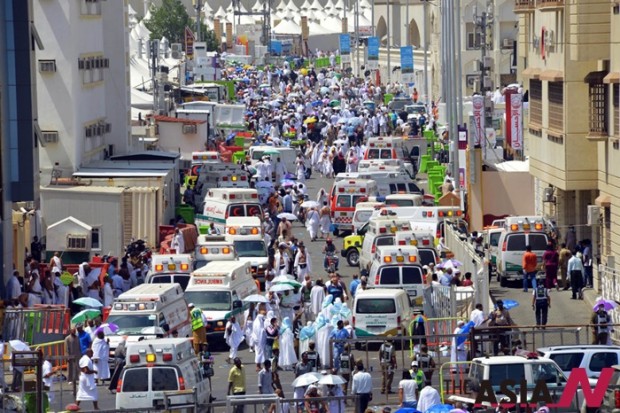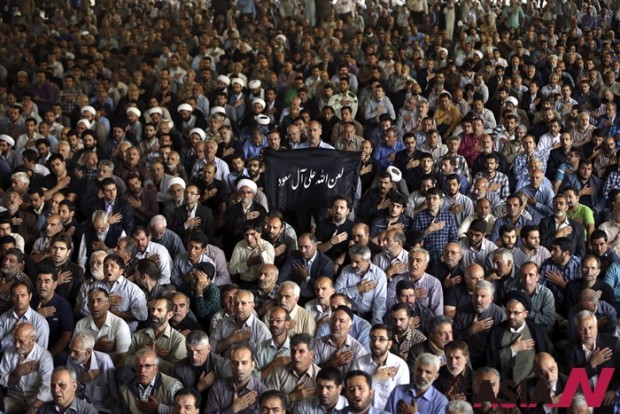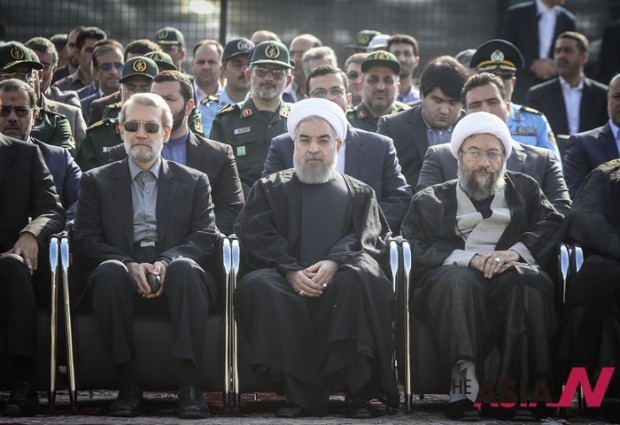Hajj: a political issue or a holy mission?

ambulances in Mecca, after people were crushed by overcrowding in Mina, Saudi Arabia during the annual hajj pilgrimage on Thursday, Sept. 24, 2015. Hundreds were killed and injured, Saudi authorities said. The crush happened in Mina, a large valley about five kilometers (three miles) from the holy city of Mecca that has been the site of hajj stampedes in years past. (Saudi Press Agency via AP)
Following last month’s stampede and the crane disaster before that, Saudi Arabia is facing a lot of criticism concerning its ability to organize hajj and ensure people’s safety, especially from its rival, Iran. As Iran started calling for the hajj to be managed by other Islamic states after at least 464 Iranians were among 1,587 pilgrims killed in the stampede, according to figures given by foreign officials.
“Saudi Arabia is incapable of organizing the pilgrimage,” said Iranian top cleric Ayatollah Mohammad Emami Kashani.
Within hours of the stampede, Iran’s Supreme Leader Ayatollah Ali Khamenei had accused Saudi Arabia of “mismanagement.” Iran’s President Hassan Rouhani suggested “ineptitude” on the part of Saudi authorities.
It escalated with Iranians protesting against Saudi Arabia outside its Embassy in Tehran, and Iranian lawmakers and clerics calling on the Organization of Islamic Cooperation to manage the hajj. Iran’s state prosecutor has vowed to “pursue the trial of (the royal family) Al Saud” through international courts for the deaths in this year’s hajj.

Iranian mourners attend the funeral ceremony of some pilgrims who were killed in a stampede during the hajj pilgrimage in Saudi Arabia last month, as a mourner holds a banner which reads in Arabic, “May Allah Curse Al-Saud,” referring to Saudi Arabia’s ruling family, at Tehran University, in Tehran, Iran, Sunday, Oct. 4, 2015. Thousands of mourners attended funeral services for the pilgrims. Iran has blamed Saudi authorities for the disaster, which heightened tensions between the two regional rivals. Saudi authorities say 769 pilgrims died in the stampede near Mecca in the worst disaster to strike the annual pilgrimage in a quarter-century. Iran appears to have lost the largest number of pilgrims, with 464 dead. (AP Photo/Vahid Salemi)
In response, King Salman of Saudi Arabia rejected any suggestions that his country should give up its privileged role as the organizer of the hajj. “The irresponsible statements aiming for political exploitation of the incident… shall not affect the role of Saudi Arabia, its duty and responsibilities in serving the guests of God,” said the Saudi prince addressing the Iranian statements.
Saudi Arabia had deployed “all its capabilities and efforts… to provide the guests of God with comfort, security and safety,” Salman said in a statement carried by SPA state news agency. He also stated that he ordered a revision of how the hajj is organized.

Iranian President Hassan Rouhani (front C) attends a ceremony to pay tribute to Iranian pilgrims killed in the latest Hajj stampede and transferred to Mehrabad airport in Tehran, capital of Iran, on Oct. 3, 2015. Rouhani on Saturday urged for an investigation into the latest Hajj stampede in Saudi Arabia which left 465 Iranian pilgrims dead. (Xinhua/Ahmad Halabisaz)
Saudi prince Turki al-Faisal criticized the Iranian allegations saying, “I think they’re trying to make political capital out of this, which is unfortunate. Human suffering shouldn’t be a tool for political shenanigans.”
Saudi Arabia had faced disasters and tragedies before with the biggest of them occurring in 1990 when over 1,400 pilgrims died in a stampede in an overcrowded tunnel. Iran has also shown its dissatisfaction with Saudi Arabia’s management of hajj in 1987 when hundreds of protesting Iranian pilgrims died.





















































